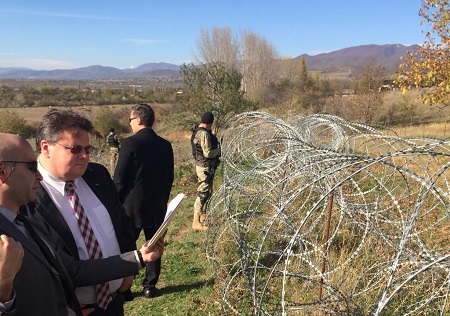Lithuanian FM shocked by barbed wire fences at Georgia’s border villages

Lithuania’s Foreign Minister Linas Linkevicius believed if Europe stood in Khurvaleti, a Georgian village located at the border of the breakaway Tskhinvali region in 2008 during the Russia-Georgia war, further violations would not happen.
Linkevicius expressed his position in a tweet after visiting Khurvaleti today, where he saw barbed wire fences installed by Russian soldiers on Georgian territory, near the so-called Administrative Boundary Line with de-facto Tskhinvali (South Ossetia).
If Europe would h stood here in 2008, further border&sov violations wouldn't h happen. #Khurvaleti occupation line pic.twitter.com/Pric6NxiJs
— Linas Linkevicius (@LinkeviciusL) October 23, 2014
The Lithuanian diplomat, who arrived in Tbilisi after a trip to Azerbaijan, wrote on Twitter before his meeting with Government and opposition officials that "Georgia was another country whose integrity being challenged by Russia lately.”
"We need to stand by strongly,” Linkevicius said.
Meanwhile, Linkevicius has already met Georgia’s Parliament Speaker David Usupashvili, Prime Minister Irakli Garibashvili, Defence Minister Irakli Alasania and the State Minister on Europe and Euro-Atlantic Integration Alex Petriashvili.
Georgia-Lithuania’s partnership relations, Georgia’s integration to the European Union (EU) and NATO as well as regional security issues were high on the agenda at today’s meetings.
The press office of Georgia’s Parliament said after Usupashvili’s meeting with Linkevicius, the Lithuanian diplomat closely watched the developments in Georgia and constantly looked for ways to assist the country.
The parties also focused on the attempts of Russia to annex Georgia’s breakaway region of Abkhazia and referred to the "Alliance and Integration” agreement recently offered by Russia to the Abkhazian de-facto regime. The deal was assessed by Georgian authorities as a continuation of Russia’s annexation policy.
"In 2008 Russia occupied Georgia’s territories and this was a serious violation of international agreements. Russia has been constantly trying to deepen this process. I could not find a word rather other than the fact Russia is striving for the legal annexation of Abkhazia. Thus, Western countries and Europe must be united to condemn this decision,” Linkevicius said after meeting his Georgian counterpart Maia Panjikidze.
"The unity and solidarity of the international community is very important for Georgia and we are striving to stop Russia. Abkhazia and South Ossetia are parts of Georgia and they will not be considered in a different way by us.”
This issue had been also discussed between Linkevicius, Petriashvili and Alasania during a working dinner in Tbilisi.
1st impressions from #Tbilisi : strong comm to #EU/#NATO reforms, need 2consolidate pol forces &increased 'attention' from the big neighbour
— Linas Linkevicius (@LinkeviciusL) October 23, 2014
The Lithuanian official reaffirmed his country’s commitment to supporting Georgia's territorial integrity and sovereignty, and condemned Russia's attempt to annex Abkhazia, the State Ministry on Europe and Euro-Atlantic Integration press office stated.
Furthermore, it was stressed that the Kremlin-proposed "Alliance and Integration” treaty with de-facto Sokhumi, the capital city of Abkhazia, was an attempt to annex Abkhazia and it was a challenge for NATO, EU and the international community in general.
At the meetings, Linkevicius expressed his desire for Lithuainia’s maximum involvement in the implementation of the NATO-Georgia Substantive Package, as well as the EU-Georgia Association Agreement, noted Georgia’s Parliament.
Lithuania is among those five European countries ratified the Georgia-European Union (EU) Association Agreement (AA).
 Tweet
Tweet  Share
Share